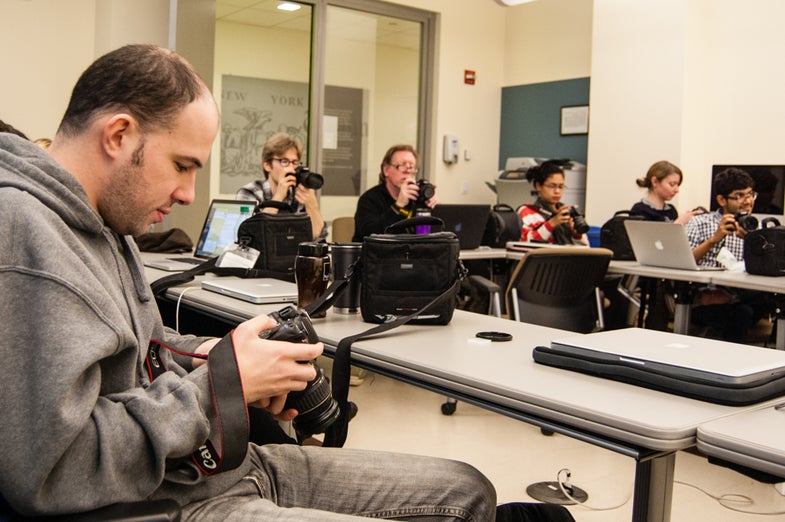Things Your Photo Teacher Wishes You Knew Before Coming to Class
Ten tips for getting the most out of your first photo class

There are a ton of great photography learning resources online, but taking a class can be a terrific way to make big leaps in your skill level. Whether you’re taking a casual class at the local high school or getting serious about photography at your university, there are some ways to make the most of your experience. We polled some photography teachers about what students can do before and during the class to get the most out of the experience.
- Photography Involves Math: You won’t need to know trigonometry, but making photographs does involve some mathematical thinking. Be prepared to start thinking in fractions to nail your exposure times. Photography, as a process, is a mixture of both science and art, so don’t let the numbers discourage you. It’s one thing to have a vision, but it won’t get you anywhere without the technical knowledge needed to execute it.
2. There is a Learning Curve: It’s highly unlikely that you will pick up a camera and start making beautiful images immediately. Like everything else, practice makes perfect. “If you don’t practice it shows,” says Tricia Gill, Photography teacher at Conway High School in Arkansas. One of the great benefits of digital photography is that you can make as many mistakes as you need without having to pay for the film. And when you do practice, make sure to have a purpose. Simply pressing the button on your camera many times isn’t going to give you the skills you need.
3. The Name and Work of At Least One Photographer: Familiarizing yourself with the work of those who came before you can help inspire your own work. Find people whose work appeals to you and your teacher may be able to help you find more photographers to check out. Building a personal photographic context can shape your influences as you develop your own style.
4. Where Your Camera Manual is, Hopefully Not in the Trash: Yes, it’s incredibly thick and reading it cover to cover is a slog, but your camera’s manual can go a long way in helping you troubleshoot your technology. Your instructor likely won’t have the time to help you figure out exactly how the different focus modes work on your specific camera, because it takes time away from the rest of the class. Knowing how your equipment works (or at least knowing where the manual lives online) can help.
5. Listen a lot more than you talk. Respect your instructor and remember that you’re there to learn form their experience. The instructor usually has a plan for the class and getting ahead or trying to “teach” the other students can get in the way of that. Coming to class with an open mind you’ll milk a lot more from your teachers than if you are trying to show off how much you already know.
6. Embrace Technology: Technology has changed rapidly in the photo world, which in many cases means the way some photo classes are taught has also changed. “Older students want photo to be the same that it was in the golden age of the ‘60s and ‘70s and it’s not,” says John Smock, Photojournalism Professor at the CUNY Graduate School of Journalism. “I think instagram is exciting, embrace that stuff, don’t just think of it as less than.”
7. Photo isn’t an “Easy A”: Photography isn’t a blow off class. You should dedicate as much effort toward it as you would other academics. Photo teachers expect the same amount of work from you as a History, English or Math teacher does. “I can’t grade creativity because it’s subjective,” says Adam Dorobiala, Adjunct Photography Faculty member at Salt Lake Community College. “Showing me that you take you work seriously and treating your schooling like a real job, might get [you] that ‘A’ they so desperately want.”
8. It’s Great to Go Beyond the Assignment: When you are first learning, you’ll probably need to overshoot your assignments. If you are taking a traditional darkroom class and a teacher asks for four final images you should expect to shoot at least two rolls of film. If you aren’t happy with the results you should keep shooting. If you aren’t pushing yourself with your work you won’t be learning anything new.
9. Don’t Be Afraid of Making Mistakes: It can be devastating when you destroy a roll of film in the darkroom or manage to accidentally expose in the field, but everyone has been there. Making mistakes while you are learning is to be expected. A mistake can be the best teacher you could ask for because it’s a lesson you’re not likely to forget.
10. Experiment: You will learn a ton if you mix up the way you are making your images. Change your perspective by laying on the ground or standing on something to shoot from above, walk around your subject and always remember Robert Capa’s advice: “If your photos aren’t good enough, you’re not close enough.”
